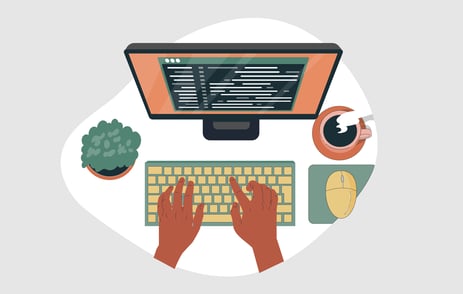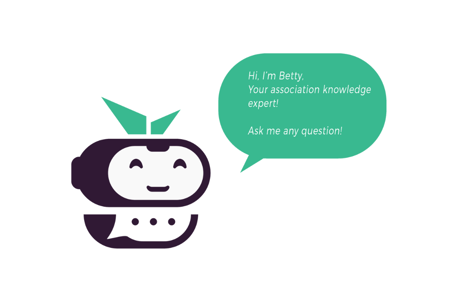As the AI landscape continues to evolve, so do the emerging tools. One of the latest and most popular is ChatGPT. Built by OpenAI, the creators of DALL·E 2, this tool provides a more human experience with a widely used marketing tool – chatbots.
And there’s no doubt it can have significant applications, with over a million users only five days after its launch. So how does it work, why is it so popular and what does it mean for the association world?
What is ChatGPT?
ChatGPT is an AI-powered chatbot that enables users to create intelligent conversations in natural language. In other words, it allows users to have a more conversational interaction with your chatbot. And because it uses natural language processing (NLP) technology, its response accuracy is significantly higher than traditional chatbots that are rule-based, providing limited responses tied directly to predefined rules or keywords.
Developed by OpenAI, ChatGPT is based on the GPT-3 model, a state-of-the-art language model trained on a large corpus of text data. While it’s designed specifically for chat applications, thanks to its ability to generate coherent and relevant text, it offers plenty of opportunities for users.
How Does it Work?
It works by first recognizing and extracting the conversation's keywords, phrases and other related data. Based on this information, it then creates a response tailored to the specific context of the conversation. This means that each response can be tailored to the user’s needs, making it an invaluable tool for businesses looking to provide better quality customer service and increase their sales conversions.
Also, because ChatGPT is powered by AI technology, organizations can rest assured that they will always have access to updated conversational models which adapt based on previous interactions with users.
What Are Some of Its Issues?
Just as quickly as ChatGPT gained attention and praise for its innovation, it has also run up against some resistance, problematic applications and in some instances, inaccuracies.
The Question of Plagiarism
While all AI-generated content is unique – as in it won’t trigger most plagiarism tools (today) – it’s still computer generated. This has quickly brought about questions in terms of its use amongst professional creatives and in the school system.
The NYC education department quickly blocked access to the OpenAI site on school devices while others have started to look at the tool as a method to help to teach writing skills or even develop conversational skills.
Regardless of its future impact, AI detection has become a top priority for many.
OpenAI has already started development on a “watermark,” which will automatically tag AI-generated content to be more easily identified, and others, including Princeton student Edward Tian, have started developing AI plagiarism detection tools for essays and academic applications.
How Accurate Is It?
It’s important to note that ChatGPT is still being updated and upgraded the more people use it. However, it isn’t at a point where it can be allowed to run independently without quality control.
According to OpenAI’s FAQ, “ChatGPT is not connected to the internet, and it can occasionally produce incorrect answers. It has limited knowledge of world and events after 2021 and may also occasionally produce harmful instructions or biased content.”
In other words, depending on what you’re asking, there’s a chance it can produce entirely wrong answers. One good example is Stack Overflow, a forum used for programming advice, which officially banned the use of ChatGPT because its responses were often inaccurate and led to issues for users.
Is it Still Worth Using?
Yes.
While ChatGPT has its issues, it's also constantly updating (the latest OpenAI update was on Jan. 9, 2023). However, ChatGPT is still in the beta phase. As such, it should be used as a tool to help speed up some of your everyday tasks but should not be allowed to run independently without human oversight.
For associations, however, it should be seen as an entry point for the adoption (or at the very least experimentation) of AI technology.
How Can Associations Use ChatGPT?
While it may take some time to understand the intricacies of NLP and the GPT-3 model, the use cases often speak for themselves. Some of the ways early adopters are using ChatGPT include:
- Generating text for social media posts or other marketing content.
- Writing and automating announcement emails for your upcoming events and new content offerings.
- Using it as a tool to create content briefs and conduct keyword research or improve SEO optimization.
- Improving the accuracy of speech recognition systems by providing context for spoken words.
- Summarizing large documents or long conversations.
- Translating text from one language to another.
- Generating personalized responses to user input in virtual assistants or other applications.
ChatGPT offers some unique applications specific to the association industry, including:
- Member Support – The benefit of AI is its ability to learn from previous interactions, creating a more personalized experience. For example, the bot could be programmed to outline member benefits, showcase upcoming events, and provide resources based on interests.
- Marketing – Whether you need help crafting social media posts or messaging for an email, ChatGPT helps summarize text and generate new content that can help streamline that process and add a more user-friendly personality to your content.
- Event Support – Many associations have annual events and conferences. Not only could ChatGPT be used to provide instant support to attendees but also it could be programmed to provide information on the event schedule, speaker information and logistical announcements.
- Member Data Analysis – AI tools improve through usage and can often provide valuable insights. With a tool like ChatGPT, you would be able to analyze common queries, interests and preferences, which could directly influence changes to your site or the content your organization creates.
The Value of AI Technologies
Overall, ChatGPT and other AI technologies can help associations improve their efficiency and effectiveness in various ways. Whether by automating tasks to free up more time or, in the case of ChatGPT, providing a self-service option that doesn’t sacrifice personalization.
The bottom line is that the growing number of AI tools on the market can help associations – particularly those looking to do more with less staff support. While they may not be readily available to implement on your site or with your event, understanding how they work and the possibilities they offer can help your organization have a future-looking approach to member engagement and operations.
Revolutionize Your Association Management Strategy
Are you ready to reach new heights in member engagement, growth, and innovation, and profitability? Start by downloading our free ebook, "Ascend: Unlocking the Power of AI for Associations." In it, you'll learn how AI works, the benefits and challenges of using AI for your association, and more.


December 13, 2022


